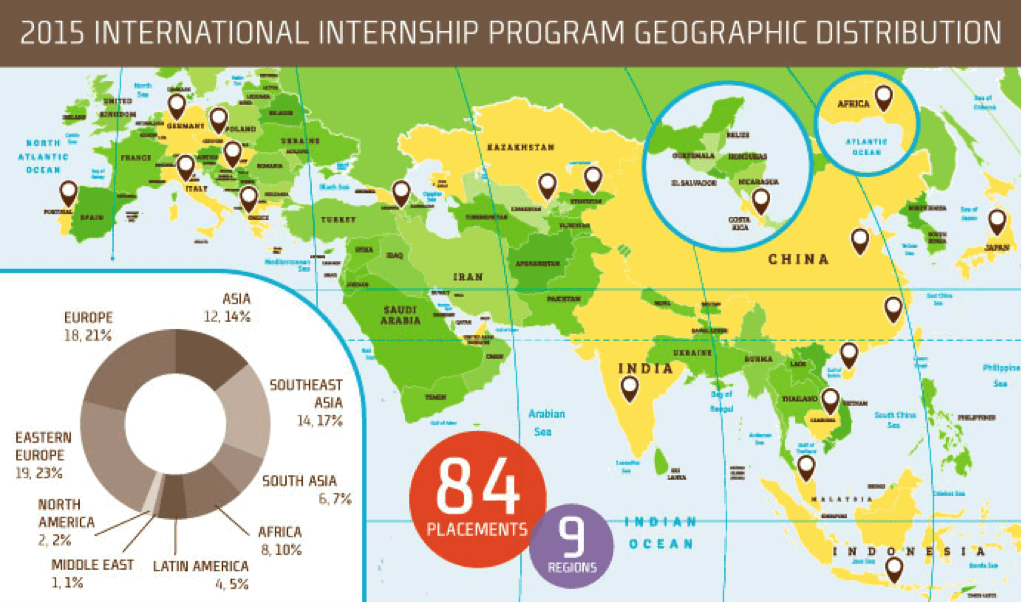Landing an internship abroad can be one of the most rewarding experiences of your young career. The right internship that both, supports your skill sets and caters to your career aspirations, is growing increasingly more difficult to find. But don’t get too down, the United States isn’t the only place offering internships, after all.
We shouldn’t limit ourselves to only domestic internship since experience with foreign internships can be incredibly valuable in establishing future connections, receiving exposure to that country’s culture, and creating a set of cherished experiences with your colleagues. Although exciting, it’s no secret that going overseas can be a pretty expensive venture.
A little spending slip there or temptation here and you’ll soon be headed on an express train back to your parent’s house — which is a common problem many students face, especially as more students head overseas to complete their intern experiences

Figure 1: A convenient geographical visual representation of how different proportions of students from the United States choosing which internships in a variety of different countries to participate in board. Source.
Despite the seemingly costly nature of overseas internships, there are a lot of ways you can be financially savvy while still having an amazing time. In fact, spending strategically can contribute to having an even more amazing adventure. Below we’ve listed a few tips your to get started on making your trip one you’ll remember for a lifetime (without breaking the bank).
1. Eat Out When It Counts
I know when you’re on the go that going out to eat may seem like the quickest and most convenient way to operate, but it can also eat up your travel budget pretty quickly. However, experiencing a culture’s cuisine is also one of the best experiences you’ll have abroad, so it’s important to allow yourself the luxury of dining out every once in awhile. Ahead of time, plan which types of restaurants you want to visit and, if possible, try to get recommendations from locals. Doing so will help you find those intricate, hole-in-the-wall places that make traveling so memorable.
2. Avoid Tourist Traps
I’m not saying you shouldn’t visit the world-class art museums or national monuments, but don’t get suckered into a lot of the things around them. Everyone who has traveled to a major city knows that the closer you get to a noteworthy attraction, the more expensive food and boutique shops become. Indulge in the culture, but try to avoid paying double for food and drink in the vicinity.
3. Public Transportation Is Your Friend
It goes without saying that public transportation is going to be your lifesaver when you travel. Not only do a lot of cities have train or bus systems that are designed to get you to the most popular places, but they’re going to be way cheaper than taking a cab or renting a car.
4. Book Your Flights Early (or Last-Minute)
Booking flights at the right time is a cornerstone of traveling efficiently. The earlier you can book your flights, the better, as the closer you get to your internship date will be flooded with other folks trying to go abroad, as well. I know this might be difficult considering that you have to wait to be hired as an intern, so also consider last minute deals, too.
5. Museums and Landmarks Are Cheap For a Reason
Other countries want you to experience their rich culture and history, so they work very hard to make museums and national attractions affordable for travelers. These are obviously some things you should check out, so it’d be advantageous to go early to beat the rush.
6. Bring a Buddy
While it might not be the easiest thing to find a travel partner last minute, bringing some along with you can be an excellent money saver (plus, you’ll have someone you can get to know and hang out with). And believe it or not, there’s already some established communities for others with the same goal.
7. Cut Back on Calling Home
Calling internationally can be expensive, so try to limit your conversations home to once or twice a week. Additionally, if you don’t want to forgo hour-long conversations with friends and family members, then look into using a free platform like Skype.
8. Check Out International Credit Cards
When traveling abroad, international transaction fees can add up pretty quickly. Although the few cents don’t seem like much, when they’re applied to every single purchase, it can become pretty daunting. Before you leave, look out for some international cards with low or no international fee.
9. Beware of Where You Exchange Money
A huge cost that can absolutely nail tourists is money exchange in places where it’s convenient (i.e.: hotels). In fact, it’s not a bad idea to go to your local bank before you leave for a trip to avoid fees. Overall, be mindful of the conversions and how they’ll impact your budget, as this is something that when not careful, can be incredibly costly.






